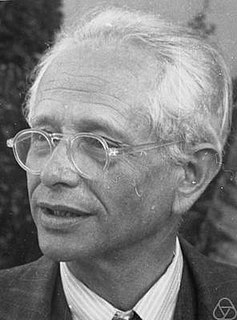Related Research Articles

David Hilbert was a German mathematician and one of the most influential mathematicians of the 19th and early 20th centuries. Hilbert discovered and developed a broad range of fundamental ideas in many areas, including invariant theory, the calculus of variations, commutative algebra, algebraic number theory, the foundations of geometry, spectral theory of operators and its application to integral equations, mathematical physics, and the foundations of mathematics.

Wilhelm Friedrich Ackermann was a German mathematician and logician best known for his work in mathematical logic and the Ackermann function, an important example in the theory of computation.

Hilbert's problems are 23 problems in mathematics published by German mathematician David Hilbert in 1900. They were all unsolved at the time, and several proved to be very influential for 20th-century mathematics. Hilbert presented ten of the problems at the Paris conference of the International Congress of Mathematicians, speaking on August 8 at the Sorbonne. The complete list of 23 problems was published later, in English translation in 1902 by Mary Frances Winston Newson in the Bulletin of the American Mathematical Society.

Luitzen Egbertus Jan Brouwer, usually cited as L. E. J. Brouwer but known to his friends as Bertus, was a Dutch mathematician and philosopher, who worked in topology, set theory, measure theory and complex analysis. Regarded as one of the greatest mathematicians of the 20th century, he is known as the founder of modern topology, particularly for establishing his fixed-point theorem and the topological invariance of dimension.

Hermann Klaus Hugo Weyl, was a German mathematician, theoretical physicist and philosopher. Although much of his working life was spent in Zürich, Switzerland, and then Princeton, New Jersey, he is associated with the University of Göttingen tradition of mathematics, represented by David Hilbert and Hermann Minkowski.

Paul Richard Halmos was a Hungarian-born American mathematician and statistician who made fundamental advances in the areas of mathematical logic, probability theory, statistics, operator theory, ergodic theory, and functional analysis. He was also recognized as a great mathematical expositor. He has been described as one of The Martians.

Max Wilhelm Dehn was a German mathematician most famous for his work in geometry, topology and geometric group theory. Born to a Jewish family in Germany, Dehn's early life and career took place in Germany. However, he was forced to retire in 1935 and eventually fled Germany in 1939 and emigrated to the United States.

Richard Courant was a German American mathematician. He is best known by the general public for the book What is Mathematics?, co-written with Herbert Robbins. His research focused on the areas of real analysis, mathematical physics, the calculus of variations and partial differential equations. He wrote textbooks widely used by generations of students of physics and mathematics. He is also known for founding the institute now bearing his name.

Paul Isaac Bernays was a Swiss mathematician who made significant contributions to mathematical logic, axiomatic set theory, and the philosophy of mathematics. He was an assistant and close collaborator of David Hilbert.

USS Hilbert (DE-742) was a Cannon-class destroyer escort in service with the United States Navy from 1944 to 1946. She was sold for scrapping in 1973.
In the philosophy of mathematics, formalism is the view that holds that statements of mathematics and logic can be considered to be statements about the consequences of the manipulation of strings using established manipulation rules. A central idea of formalism "is that mathematics is not a body of propositions representing an abstract sector of reality, but is much more akin to a game, bringing with it no more commitment to an ontology of objects or properties than ludo or chess." According to formalism, the truths expressed in logic and mathematics are not about numbers, sets, or triangles or any other coextensive subject matter — in fact, they aren't "about" anything at all. Rather, mathematical statements are syntactic forms whose shapes and locations have no meaning unless they are given an interpretation. In contrast to mathematical realism, logicism, or intuitionism, formalism's contours are less defined due to broad approaches that can be categorized as formalist.
Events from the year 1929 in France.
Events from the year 1976 in France.
Events from the year 1967 in France.
Events from the year 1943 in France.

Within the philosophy of color, there is a dispute between color realism, the view that colors are physical properties that objects possess, and color fictionalism, a species of error theory viewing colors according to which there are no such physical properties that objects possess.
1996 in philosophy
1947 in philosophy
2012 in philosophy
Events from the year 1862 in Germany.
References
- ↑ Zach, Richard. "Hilbert's Program". The Stanford Encyclopedia of Philosophy (SEP). Retrieved 19 February 2013.